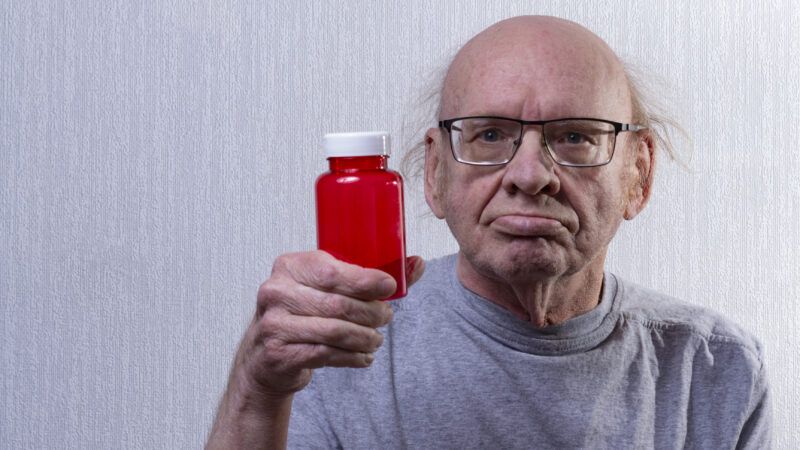Biden's Drug Price Controls Would Make Americans Sicker and Shorten Their Lives
The plan would reduce supply while increasing demand, resulting in harmful shortages.

Part of the way that the Biden administration and congressional Democrats want to pay for their $3.5 trillion social welfare "infrastructure" plan is by forcing pharmaceutical companies to lower the prices they charge the government for their medications. Democrats argue that benchmarking the prices paid for certain prescription drugs to prices paid by other developed countries will offset around $500 billion in government spending over the next ten years. Voilá—one-seventh of their infrastructure plan would be paid for.
First, I have been highly critical of pharmaceutical industry shenanigans such as paying off would-be competitors to delay introducing generic versions of their patented drugs and making minor tweaks to the formulations of their drugs as a way to drag out their patent protection beyond the 20 years they are granted. Some of the Biden administration's proposals are aimed at fixing those problems. So far so good.
However, imposing price controls on drugs is central to Democrats' plan to "save" $500 billion as a way to finance their massive new bill. Congress is supposed to authorize the secretary of the Department of Health and Human Services (HHS) to negotiate prices for medications with pharmaceutical companies. "An effective negotiation policy must establish criteria for market failure, define a fair price, provide the Secretary with tools and guidelines to negotiate a fair price, and incentivize pharmaceutical companies to participate in the negotiation process," states the HHS comprehensive plan. In addition, the negotiated (controlled) prices would not just be limited to government purchases, but also to commercial distributors and insurers.
Just how will the HHS "incentivize" companies to negotiate, i.e., lower their prices? Most likely by Congress enacting something like the Elijah E. Cummings Lower Drug Costs Now Act (H.R.3) which was passed by the House of Representatives back in 2019. "Under H.R.3, if drug manufacturers do not agree to participate in negotiations, or do not agree to the negotiated price, they would be subject to an escalating excise tax on the sale of the drug in question," explained Tax Foundation economist Erica York. "The tax would kick in at 65 percent and would rise by 10 percentage points each 90 days the manufacturers are in 'noncompliance,' reaching a maximum tax rate of 95 percent." In addition, such excise taxes would not be deductible, which means drug manufacturers would have to pay taxes on their taxes, in which case companies could actually lose money if the punitively taxed drug were sold in the U.S.
Today's patients might enjoy the lower drug prices that these price controls afford them now, but tomorrow's patients would experience greater misery and more deaths than would have otherwise been the case. Let's rehearse basic economics one more time: Price controls reduce supply while increasing demand which results in shortages. What kind of shortages are we looking at? Fewer new medications in the future. Why? Because drug manufacturers would have far less revenue to invest in discovering, developing, and deploying new pharmaceuticals. How many fewer? A 2019 Congressional Budget Office (CBO) analysis sanguinely calculated that imposing price controls would prevent only 8 to 15 new treatments from reaching patients over the next 10 years.
The CBO estimate is way too low argue University of Chicago economists Tomas J. Philipson and Troy Durie in their issue brief on the topic published earlier this week. They review the econometric literature and find that drug price controls would "lead to a 29 to 60 percent reduction in R&D from 2021 to 2039 which translates into 167 to 342 fewer new drug approvals during that period." This reduction in the development of new drugs is more than 10 times greater than the CBO calculated. The researchers conclude that the proposed price controls would significantly cut the number of new drugs and would therefore "lead to delays in needed drug therapies, resulting in worse health outcomes for patients."
If President Joe Biden and congressional Democrats really want to lower pharmaceutical prices, they should instead adopt radical Food and Drug Administration reforms aimed at enhancing competition among drug manufacturers. Such reforms would include allowing drug companies to sell their medications to willing patients once they've passed Phase I and Phase II safety and efficacy trials and reining in the agency's power to require prescriptions.
Ultimately, government drug price controls will result in more sick and dead Americans.


Show Comments (36)